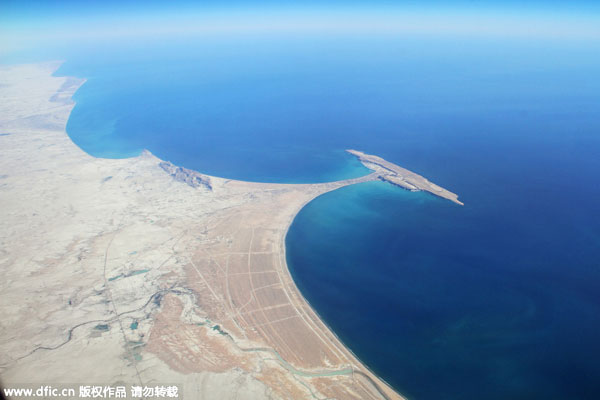 |
|
Gwadar Port in Pakistan's western province of Balochistan, in this?Feb 16, 2013 file photo. [Photo/IC] |
Infrastructure construction is nearly complete and the port could be put into full use by the end of the year, Dostain Khan Jamaldini, chairman of the Gwadar Port Authority, was quoted as saying. It could serve as a vital economic hub linking China and Pakistan, he said.
Gwadar, on the shores of the Arabian Sea in Pakistan's western province of Balochistan, occupies a strategic location between South and Central Asia and the Middle East, being situated at the mouth of the Persian Gulf, just outside the Strait of Hormuz, gateway for about 20 percent of the world's oil.
It is also the end of the China-Pakistan Economic Corridor, which runs about 3,000 kilometers from Gwadar to the northwestern Chinese city of Kashgar, an important part of the ancient Silk Road linking China with Eurasia and Africa.
Oil from the Middle East could be offloaded at Gwadar and transported to China through the corridor, cutting the current 12,000 km journey to 2,395 km.
The TV station quoted Riaz Mohammad Khan, advisory board member of the Center for International Strategic Studies as saying: "It (the port) will turn the tables… it will really benefit Pakistan and China".
The economic corridor is an under-construction development connecting Gwadar to China's Xinjiang via roads, railways and pipelines to transport oil and gas. It will act as a bridge for the new Maritime Silk Route that envisages linking 3 billion people in Asia, Africa and Europe, part of a trans-Eurasian project proposed by President Xi Jinping in 2013.
"Oil from the region to China will be facilitated," said Pakistani President Asif Ali Zardari in 2013 when China was given the contract to operate the port. Gwadar would become a hub of trade and commerce in the region, bringing together the countries of Central Asia and lending new impetus to Pakistan-China relations, he said.
China is expected to invest $1.62 billion in the Gwadar project, including construction of an eastern expressway linking the harbor and coastline, an international airport, breakwater and nine other projects expected to be complete in three to five years.
Gwadar will soon start building a container terminal measuring 1,200 meters and a 300-meter-long cargo terminal that can harbor four berths.
When fully operational, Gwadar will promote the economic development of Pakistan and become a gateway for Central Asian countries, including Afghanistan, Uzbekistan, linking Sri Lanka, Iran and Xinjiang to undertake marine transport.